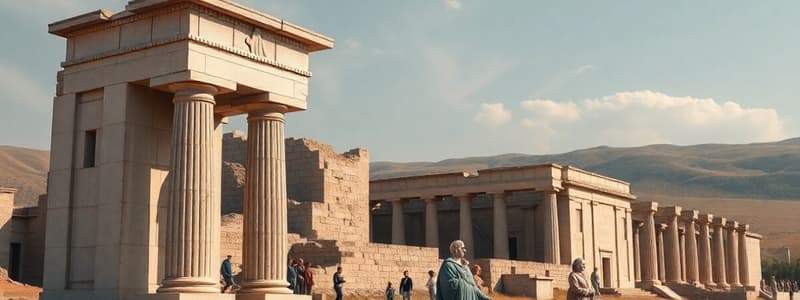Podcast
Questions and Answers
What did Thales identify as the primary substance of all living things?
What did Thales identify as the primary substance of all living things?
- Fire
- Earth
- Air
- Water (correct)
Which period of Western philosophy is characterized by a focus on divine or religious aspects?
Which period of Western philosophy is characterized by a focus on divine or religious aspects?
- Contemporary Philosophy
- Ancient Philosophy
- Modern Philosophy
- Medieval Philosophy (correct)
Which philosopher is known for stating that the primary substance is 'the Boundless'?
Which philosopher is known for stating that the primary substance is 'the Boundless'?
- Socrates
- Anaximander (correct)
- Anaximenes
- Pythagoras
In what geographical region did the early philosophers like Thales, Anaximander, and Anaximenes originate?
In what geographical region did the early philosophers like Thales, Anaximander, and Anaximenes originate?
Which philosophical concept is associated with the thinkers of the Hellenistic period?
Which philosophical concept is associated with the thinkers of the Hellenistic period?
Which activity did the ancient inhabitants of Greece engage in due to their geographical conditions?
Which activity did the ancient inhabitants of Greece engage in due to their geographical conditions?
Which of the following philosophers is paired with the correct era?
Which of the following philosophers is paired with the correct era?
What did Anaximander theorize about the evolution of man?
What did Anaximander theorize about the evolution of man?
According to Anaximenes, what are the two processes that air undergoes?
According to Anaximenes, what are the two processes that air undergoes?
Which philosopher believed that the "only permanent thing in this world is CHANGE"?
Which philosopher believed that the "only permanent thing in this world is CHANGE"?
What is the main difference between Anaximenes' and Heraclitus' theories?
What is the main difference between Anaximenes' and Heraclitus' theories?
What is the meaning of "metempsychosis" as it relates to Pythagoras' philosophy?
What is the meaning of "metempsychosis" as it relates to Pythagoras' philosophy?
According to the content, what are the key characteristics of ancient Greek philosophers' understanding of man?
According to the content, what are the key characteristics of ancient Greek philosophers' understanding of man?
Flashcards
Anaximenes
Anaximenes
Philosopher who asserted air as the primary substance of all matter.
Heraclitus' Change
Heraclitus' Change
Heraclitus stated that change is the only constant in life, exemplified by the river analogy.
Pythagorean Philosophy
Pythagorean Philosophy
Belief that all things are based on numbers and that the soul is divine and immortal.
Leucippus & Democritus
Leucippus & Democritus
Signup and view all the flashcards
Microcosm
Microcosm
Signup and view all the flashcards
Ancient Philosophy
Ancient Philosophy
Signup and view all the flashcards
Thales
Thales
Signup and view all the flashcards
Anaximander
Anaximander
Signup and view all the flashcards
Primary Substance
Primary Substance
Signup and view all the flashcards
Cosmo-Centric Philosophy
Cosmo-Centric Philosophy
Signup and view all the flashcards
Ionians
Ionians
Signup and view all the flashcards
Socratic Philosophy
Socratic Philosophy
Signup and view all the flashcards
Hellenistic Philosophy
Hellenistic Philosophy
Signup and view all the flashcards
Study Notes
Brief History of Philosophy
- Philosophy has a rich history, tracing through periods.
- Ancient philosophy (600-300 AD) was cosmo-centric, focusing on the universe.
- Key figures include Thales, Pythagoras, and Socrates.
- Medieval philosophy (300-1400 AD) was theocentric, centered on God.
- Key figures include St. Anselm, Aquinas, and Augustine.
- Modern philosophy (500-1800 AD) was anthropocentric, focusing on human beings.
- Key figures include Descartes, Locke, and Marx.
- Contemporary philosophy (1900-present) focuses on analytic philosophy, language, and natural sciences
- Key figures include Tolstoy, Nietzsche, and Husserl.
Periods in Western Philosophy
- Ancient period (600-300 AD) - Cosmo-centric
- Medieval period (300-1400 AD) - Theo-centric
- Modern period (500-1800 AD) - Anthropocentric
- Contemporary period (1900-Present) - Analytic philosophy, language, natural sciences
Ancient Philosophy
- Pre-Socratic Period - Thales, Pythagoras, Anaximander
- Socratic Period - Socrates, Aristotle, Plato
- Hellenistic Period - Stoicism (Zeno), Cynicism, Epicureanism
What I can control and what I can’t
- Focuses on the concept of control in human life
- The past, the future, actions of others, opinions of others: are outside of personal control
- Personal thoughts, actions, setting goals, speech to self, handling challenges – are within personal control.
- Understanding your sphere of influence helps with personal development.
Ancient Greece
- Geography: Greece is a mountainous, rather barren country.
- Coastal colonies: in the 6th century BC, a vast network of coastal colonies extended from Asia Minor through Africa to Spain and southern Italy.
City of Miletus
- The Ionian philosophers, active in Miletus, Asia Minor, profoundly shaped the development of philosophy.
- Key figures: Thales, Anaximander, Anaximenes.
- They questioned the fundamental substance of reality (or Primary Substance).
The First 3 Western Philosophers
- Thales, Anaximander, and Anaximenes, from Miletus, initiated Western philosophy by pondering the primary substance of the universe.
- They sought fundamental principles and causes of existence, pushing philosophy towards its core questions.
Thales (625-545 BC)
- Thales proposed water as the primary substance.
- He believed that water is the fundamental element of all things, and that other elements were formed from it through transformations.
Anaximander (610-547 BC)
- Anaximander identified an unknown, boundless, and undefined primary substance.
Anaximenes (585-525 BC)
- Anaximenes proposed air as the primary substance.
- He believed that air undergoes transformations through condensation and rarefaction.
Heraclitus (540-480 BC)
- Heraclitus emphasized the importance of change.
- He famously stated, "You cannot step in the same river twice"
- He proposed fire as the fundamental element of the universe.
Pythagoras
- Pythagoras emphasized the importance of numbers.
- He believed that numbers underlie everything in the universe, including space and measure.
- He thought that the soul was immortal, divine and subject to metempsychosis (reincarnation).
- The soul is imprisoned within a body until it is purified and thus reunited with the divine.
Leucippus & Democritus
- Leucippus and Democritus, the atomists.
- They argued that all matter is composed of tiny, indivisible particles called atoms.
- These atoms were indestructible, indivisible, eternal, and uncreated.
- Their interactions explain forms and types of matter.
Ancient Greek Philosophy - Key Questions
- What is man?
- What is the implication (values)?
- Man is seen as a microcosm, a miniature universe mirroring larger principles.
Studying That Suits You
Use AI to generate personalized quizzes and flashcards to suit your learning preferences.




